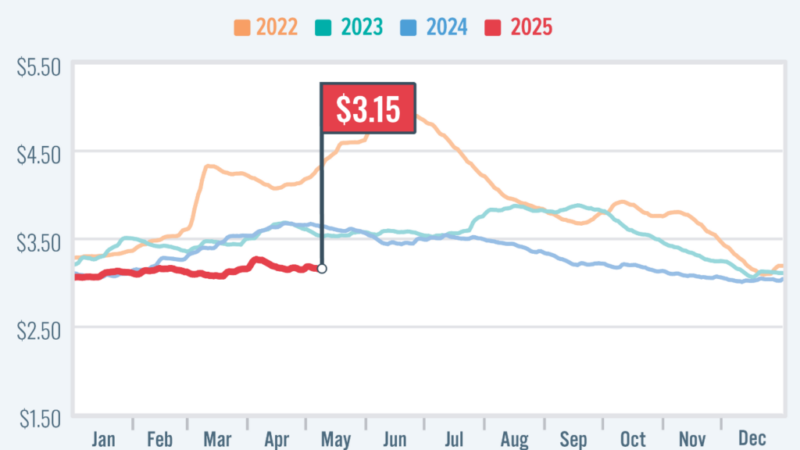Morgan Stanley’s Stanek: Managing Wealth in Difficult Times

Brad Stanek
EDITOR’S NOTE: The following is a guest column by Brad Stanek, CFP, a Senior Vice President of The Stanek Group at Morgan Stanley in Chicago.
Managing Your Wealth as a Dealer in Challenging Times
Four key strategies designed to protect and grow your net worth in the face of economic headwinds
Despite the triple headwinds of recession, inflation and rising interest rates, business the last few years has been as strong as ever. You’ve built substantial wealth in recent years and some of you have likely received unsolicited offers to buy your dealership. While that may be flattering and rewarding, most of you have been in this business long enough to know the good times can’t last forever. It pays to plan ahead.
2023 is expected to be a slower, yet profitable year, where managing inventory and expenses will be the key to turning a profit. Industry consolidation continues to be quite active. That puts pressure on many of you who are smaller independents to compete effectively in the changing dealer landscape. Meanwhile, with inflation and interest rates stubbornly remaining at a four-decade high, purchasing power is not what it used to be for you and your customers.
You’ve worked too hard to build a successful business to leave your future (and your family’s future) to chance. Now’s the time to be diligent about protecting your wealth from Uncle Sam, inflation erosion and potential litigants.
TUG OF WAR BETWEEN TAX SAVINGS AND BUSINESS VALUATION
The Inflation Reduction Act was passed in August and the current administration shows no signs in slowing down their spending habits. Even with Republicans taking narrow control over the House of Representatives, there is still talks increasing taxes. In fact, even without a bill being passed, some major tax breaks will expire at the end of 2025, such as the highest personal tax rate of 37% automatically going to 39.6% without even needing a vote. Emboldened by recent legislative wins, progressive lawmakers will likely revisit capital gains taxes as well on wealthy individuals and successful businesses of all sizes.
We all want to save money on taxes. Just remember that certain tax strategies that save you money now, can lower offers you might receive from potential buyers in the future. I see this all too often when a dealer’s CPA and other advisors reduce business income too aggressively. As a result, potential buyers don’t see the full earning power of the business and that means lower multiples and tougher deal terms.
Make sure your CPA and your transaction advisors not only understand the nuances of what’s customary in the RV industry but are capable of developing tax strategies that optimize your business valuation in the long-term.
FOUR WAYS TO MINIMIZE TAXES WITHOUT REDUCING ENTERPRISE VALUE
1. Company retirement plans. There are a few retirement plan options for business owners, such as the SIMPLE IRA ($15,500 maximum allowable contribution; $19,000 for those 50 or older) or the 401(K) plan ($22,500 maximum allowable contribution; $30,000 for those 50 or older). It’s a start, but I strongly recommend asking your accountant, financial advisor, and bookkeeper to help you customize your dealership’s retirement plan further through tools like a discretionary profit share, a SEP IRA, or even a defined benefit cash balance plan. For example, one dealer we’re working with was able to put in an additional $200,000 a year tax-free into his retirement plan on behalf of himself and his employees. That extra $200,000 was far more than he and his employees would have received if paid out in bonuses—bonuses that would have been taxed as ordinary employment income.
Source: Retirement Topics – SIMPLE IRA Contribution Limits | Internal Revenue Service (irs.gov)
2. Captive insurance strategies. Many of you self-insure extended warranties and other F&I products. But nine out of ten dealers I speak with tell me they don’t insure against other risks through their captive entity such as health, workers comp, or other commercial risks – this is why you may want to consider a captive insurance strategy.
If you think about the insurance coverages within the policy that have very low loss ratios, with a captive, you’re keeping the difference that the insurance company would normally keep. That money’s going to build up at a low tax rate in an entity that is creditor protected. So, if anything happens to the business, the money in the captive policy is considered separate, which builds up additional funds for your retirement. Captive insurance isn’t designed to replace all your traditional insurance coverage. Instead, it can complement your current risk management strategy. And, in the process, it can enable you to enhance your overall risk coverage, reduce your income tax payments, and potentially build your wealth.
Contact me any time for a complimentary 30-minute consultation about captive insurance.
3. Cost segregation studies. Many dealers are not familiar with a cost segregation study (aka component depreciation). That’s a lost opportunity, especially if you own the real estate on which your dealership sits. On the surface, the IRS only allows you to depreciate your real estate in equal amounts over 39 years. But there are tax specialist firms with experienced engineers, attorneys, and accountants on staff, that can break down every single component of your real estate assets and identify certain segments that can be depreciated in far less than 39 years. This boosts your depreciation deduction sooner, reducing what you would owe in tax compared to straight line depreciation over 39 years.
4. SALT Tax. When the 2017 Tax Cuts & Jobs Act was enacted, one notable provision was the limiting of itemized deductions for state and local taxes (SALT) to $10,000 through 2025. That was a big blow for many of you in high-tax states, since you likely pay far more than $10,000 a year in state and local taxes. However, some states have implemented the so-called SALT tax “workaround,”. Please note that this legislation is state specific and should be reviewed with your accountant to understand the implications for your personal situation.
Conclusion
We have helped many of your RVDA peers with tax mitigation and wealth building strategies through our Second Opinion Service (i.e. Total Wealth Analysis). Take a moment to review it and let me know what you think.
About the author
Brad Stanek, CFP® is a Senior Vice President of The Stanek Group at Morgan Stanley in Chicago, IL [email protected] | 312-648-3381
The information contained in this article is not a solicitation to purchase or sell investments. Any information presented is general in nature and not intended to provide individually tailored investment advice.
The views expressed herein are those of the author and may not necessarily reflect the views of Morgan Stanley Smith Barney LLC, Member SIPC, or its affiliates.
When Morgan Stanley Smith Barney LLC, its affiliates and Morgan Stanley Financial Advisors and Private Wealth Advisors (collectively, “Morgan Stanley”) provide “investment advice” regarding a retirement or welfare benefit plan account, an individual retirement account or a Coverdell education savings account (“Retirement Account”), Morgan Stanley is a “fiduciary” as those terms are defined under the Employee Retirement Income Security Act of 1974, as amended (“ERISA”), and/or the Internal Revenue Code of 1986 (the “Code”), as applicable. When Morgan Stanley provides investment education, takes orders on an unsolicited basis or otherwise does not provide “investment advice”, Morgan Stanley will not be considered a “fiduciary” under ERISA and/or the Code. For more information regarding Morgan Stanley’s role with respect to a Retirement Account, please visit www.morganstanley.com/disclosures/dol. Tax laws are complex and subject to change. Morgan Stanley does not provide tax or legal advice. Individuals are encouraged to consult their tax and legal advisors (a) before establishing a Retirement Account, and (b) regarding any potential tax, ERISA and related consequences of any investments or other transactions made with respect to a Retirement Account.
The services, strategies and investments discussed may not be appropriate for all investors. Morgan Stanley Smith Barney LLC recommends that investors independently evaluate particular services, strategies and investments, and encourages investors to seek the advice of a financial advisor. The appropriateness of a particular service, strategy or investment will depend upon an investor’s individual circumstances and objectives.
Morgan Stanley Smith Barney LLC offers insurance products in conjunction with its licensed insurance agency affiliates.
Information contained herein has been obtained from sources considered to be reliable, but we do not guarantee their accuracy or completeness.
CFP Board owns the mark CFP® in the U.S.
Source: https://rvbusiness.com/morgan-stanleys-stanek-managing-wealth-in-difficult-times/







